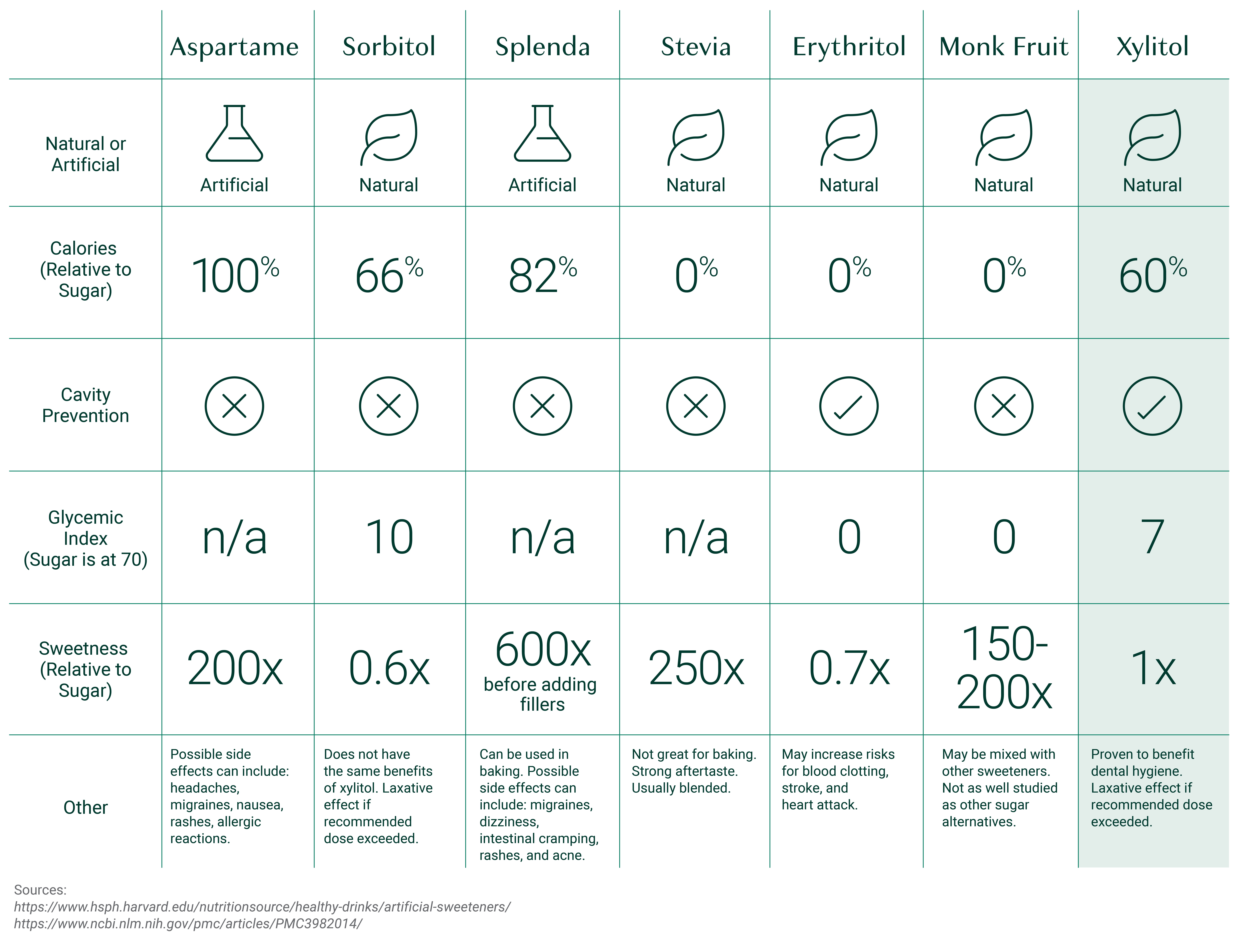Are you in the mood for something sweet — but without the guilt? Then you’ll be amazed to know that there’s a natural sugar with a list of health benefits you won’t believe!
That’s right. You can enjoy the sweet taste of sugar minus the health issues that come with it. This natural sugar gives you the best of both worlds.
So don’t settle for sugar with a downside — go ahead and indulge in this bone healthy alternative and reap all the benefits!
What is Xylitol?
Xylitol (rolled off the tongue like zy-luh-tol) is like a godsend of natural sweetness. This naturally occurring sugar alcohol is found in small amounts in fruits, vegetables, and mushrooms.
Contrary to the term, a sugar alcohol isn’t a sugar or an alcohol, but rather a molecule derived from a sugar.
This miracle molecule dishes out the flavor you love without all the extra calories and blood glucose spikes of regular sweeteners. It’s like a secret weapon in the battle against sugar cravings and unwanted side effects. That’s why it’s been popping up more and more in products lately. It’s a sugar substitute like no other!
What is Xylitol Made From?
As mentioned, xylitol is found in small amounts in fruits and vegetables and can be sourced from oats and mushrooms.
But the amounts in these foods are insignificant for food, gum, and supplement companies to use. So instead they tend to source xylitol from either corn husks, the fibrous remains of sugar cane harvesting and/or hardwood trees, namely birch, as xylan.
4 Unexpected Xylitol Benefits
Fewer Calories
Craving the taste of sugar but don’t have the calories to spare? Good news. Xylitol has 40% fewer calories than regular sugar. While table sugar has 4 calories per gram, xylitol only has 2.4 calories.
In other words, a teaspoon of table sugar contains 16 calories compared to 9.6 calories in a teaspoon of xylitol. Now that may not seem like a lot. But when you consider the average American consumes 130 pounds or more of added sugar per year, it could make a huge difference [1].
Doesn’t Spike Blood Glucose
One of the most notable xylitol health benefits is that it doesn’t cause the same nasty spike to your blood glucose and insulin levels as sugar does [2]. This is why you will find it in many reduced sugar and low/no-carb products.
It’s even recommended as a sugar substitute for people with diabetes or other problems related to carbohydrate metabolism. Now everyone can have their cake and eat it too.
Reduces Dental Decay and Cavities
So how exactly is xylitol good for your teeth? Well, unlike sugar, xylitol has surprisingly been shown to reduce dental decay and cavities. Because of its structure, pathogenic (bad) bacteria in the mouth that cause cavities can’t digest it.
In fact, the bad bacteria consumes xylitol and ultimately starves and ‘dies’. The good news is that your healthy bacteria doesn’t seem to be affected by xylitol.
This, in turn, leads to healthy bacteria surviving, bad bacteria dying, and cavities being prevented. In fact, studies have shown that replacing sugar with xylitol or adding it on top of your diet can reduce tooth decay and cavities by as much as 30-85% [3]!
Boosts Collagen Production
This will perk you and your skin up if you’re worried about the appearance of aging: xylitol has been shown in animal studies to boost collagen production [4].
Collagen is a naturally occurring protein found in skin associated with a plump, youthful appearance. You’ve probably heard this term many times in beauty product and procedure commercials because as we get older, the body produces less collagen. Attempting to dip into the fountain of youth, beauty companies add it to their products.
Xylitol consumption has been shown to naturally increase collagen production [5]. How? It directly affects collagen synthesis (the process of creating collagen) by increasing hydroxyproline content, which plays a role in collagen stability.
More collagen is a beautiful reason in and of itself to swap out products with added sugar for those with xylitol.
Xylitol and Bone Health
Another benefit of xylitol is that in rodent studies, it has been shown to increase bone strength by increasing calcium absorption and deposition into the bone matrix [6].
Several of these studies have been completed in rodents using a variety of methods and with the same results — an increase in bone density [7]. That makes swapping out sugar and other sugar alternatives for xylitol a potential benefit to your bones.
And remember how xylitol benefits your teeth? Well, if xylitol decreases cavity-causing bacteria in your mouth this is going to reduce oral inflammation associated with cavities and gum disease.
More and more it looks like the key to great health and longevity is reducing inflammation, as it is the root of many diseases and promotes the progression of disease states. Swapping out sugar or other sugar additives for xylitol may be one way of increasing bone mass while curbing inflammation.
Comparison of Sugar Alternatives
We’ve discussed what xylitol is and its benefits. Now let’s compare it with other popular sugar substitutes.

Xylitol. Xylitol is equally sweet as sugar with 40% fewer calories and comes with a few health perks. Some xylitol health benefits include: a decrease in cavities, reduction in oral inflammation, increase in collagen and stronger bones.
Stevia, Splenda, and aspartame are all significantly sweeter than sugar with zero calories, but without xylitol’s health benefits. Let’s take a look at how they compare…
Stevia. Stevia is 40 times sweeter than sugar but it yields zero calories. So it doesn’t elevate blood glucose levels. Interestingly some find that stevia sweetened products have a metallic or licorice-like aftertaste to them.
Although stevia was once banned in the United States by the FDA, purified stevia extracts are now considered safe.
Splenda. The trademarked name for sucralose, Splenda, was originally thought to be the latest and great sugar alternative when it hit the market. But it’s recently fallen out of favor. Sucralose is 320 to 1,000 times sweeter than sugar and has zero calories.
While sucralose hasn’t been associated with any health benefits, it has been linked with some controversies regarding advertising and safety.
Aspartame. This zero-calorie artificial sweetener is about 200 times sweeter than sugar, but its uses are limited because it breaks down when heated.
Also, aspartame breaks down to a molecule called phenylalanine, so it is not recommended for anyone with a condition called phenylketonuria (PKU). Some find that consuming aspartame gives them headaches.
Sorbitol. Sorbitol, like xylitol, is a sugar alcohol. But unlike xylitol, it comes with more of a caution regarding digestion.
It has a significant laxative effect and isn’t recommended for consumption in the elderly without clinical consultation. Sorbitol is not recommended for Individuals with celiac disease, IBS, ulcerative colitis and/or other issues affecting intestinal health.
Erythritol. Also a sugar alcohol, erythritol has about 70% of the sweetness of sugar and is considered zero-calorie. It has no lingering aftertaste and doesn’t spike blood sugar.
Its levels are typically more than 1,000-fold greater than levels found naturally in foods. And this is not good. In fact, researchers found that people who had more erythritol in their blood were at a higher risk for blood clotting, stroke, heart attack, and death [8][9].
Monk Fruit. Monk fruit extract is 150 to 200 times sweeter than sugar. This zero calorie sugar substitute gets its intense sweetness from unique antioxidants called mogrosides. To balance out its intensity, some manufacturers mix the extract with different sugars.
But this can change the sweetener’s nutritional profile. Since monk fruit is hard to grow and costly to export, it’s not as widely available as other sweeteners. Also, it’s relatively new on the scene. As such, it has not been as well studied as other low-calorie sugar alternatives.
Xylitol Side Effects and Dosing
Because xylitol is naturally occurring, it’s safe to consume and generally well tolerated – although some side effects include bloating, nausea, gas, and diarrhea if you eat too much.
“Too much” is subjective, but for the most part amounts greater than 30 to 40 grams, or 7 to 10 teaspoons, of xylitol in a day would be regarded as the too much that causes gastric distress [10].
Slowly increasing the amount of xylitol you consume over time and breaking it up throughout the day is going to help circumvent or completely avoid digestive woes.
Xylitol poisoning in humans is rare. But it can have some potential harmful effects. Thankfully, for most people, these effects are minimal.
When creating our Triple Power Omega 3 Fish Oil, we were searching for a sugar alternative that would not only add flavor, but also maximize the bone health benefits of the product. So we decided on xylitol.
Take Home Message
Xylitol is safe and contains 40% fewer calories than sugar with added health benefits to your skin, teeth, bones and overall health.
When it comes to choosing products like Triple Power Omega 3 Fish Oil, xylitol stands out as another reason to choose it over other products.
That and the sweet novelty of having a fish oil that you actually crave instead of dread.
To learn more about how to keep your bones happy and healthy, sign up for our newsletter for updates on the latest in bone health.
FAQs
Is xylitol good or bad for you?
Xylitol is good for you. Some of its studied health benefits include: a decrease in cavities, reduction in oral inflammation, increase in collagen, and stronger bones.
Does xylitol really help teeth?
Yes, it does. In fact, studies have shown that replacing sugar with xylitol or adding it on top of your diet can reduce tooth decay and cavities by as much as 30-85% [3]!
Why isn’t xylitol more popular?
Compared to sugar, xylitol is more expensive.
Is xylitol natural or artificial?
Xylitol is a naturally occurring sugar alcohol.
What is xylitol made from?
Xylitol is found in small amounts in fruits, vegetables, oats and mushrooms. It can also be sourced from either corn husks, the fibrous remains of sugar cane harvesting, and/or hardwood trees, namely birch, as xylan.
Is xylitol safe for consumption?
Yes, it’s safe to consume and generally well tolerated. But, there is one family member who cannot safely have any amount of xylitol. And that’s your dog. The most common form of xylitol poisoning in dogs is from sugar-free gum (that contains xylitol). So keep all xylitol and xylitol-containing food products and supplements out of your dog’s reach.
References
- https://www.ers.usda.gov/data-products/ag-and-food-statistics-charting-the-essentials/food-availability-and-consumption/
- Salminen, S., Salminen, E. & Marks, V. “The effects of xylitol on the secretion of insulin and gastric inhibitory polypeptide in man and rats.” Diabetologia 22, 480–482 (1982). https://doi.org/10.1007/BF00282594
- A Scheinin, K K Mäkinen, E Tammisalo, M Rekola, “Turku sugar studies XVIII. Incidence of dental caries in relation to 1-year consumption of xylitol chewing gum” Clinical Trial Acta Odontol Scand., 1975;33(5):269-78. doi: 10.3109/00016357509004632
- M L Knuuttila 1, T H Kuoksa, M J Svanberg, P T Mattila, K M Karjalainen, E Kolehmainen, “Effects of dietary xylitol on collagen content and glycosylation in healthy and diabetic rats” Life Sci. 2000 Jun 8;67(3):283-90. doi: 10.1016/s0024-3205(00)00621-4.
- Pauli T Mattila 1, Päivi Pelkonen, Matti L E Knuuttila, “Effects of a long-term dietary xylitol supplementation on collagen content and fluorescence of the skin in aged rats” Gerontology. 2005 May-Jun;51(3):166-9. doi: 10.1159/000083988.
- P T Mattila 1, M J Svanberg, M L Knuuttila, “Increased bone volume and bone mineral content in xylitol-fed aged rats” Gerontology. 2001 Nov-Dec;47(6):300-5. doi: 10.1159/000052818.
- Hirokazu Sato 1, Yoshiaki Ide 2, Masanori Nasu 3, Yukihiro Numabe 4, “The effects of oral xylitol administration on bone density in rat femur” Odontology. 2011 Jan;99(1):28-33. doi: 10.1007/s10266-010-0143-2. Epub 2011 Jan 27.
- https://www.nih.gov/news-events/nih-research-matters/erythritol-cardiovascular-events
- https://health.clevelandclinic.org/erythritol/
- https://www.nih.gov/news-events/nih-research-matters/erythritol-cardiovascular-events; https://health.clevelandclinic.org/erythritol/






Ann Hancock
April 8, 2017 , 7:13 amI’m so pleased you mentioned the fact that Xylitol is *extremely* deadly for dogs. A friend of mine lost her beloved dog when he ate some sugar free gum.
And the first question a vet asks when you bring in your dog with a digestive issue is:
“has s/he eaten anything like sugar free gum or candy?”
I wish this information was MUCH nearer to the introduction, rather than buried at the end of the article where many may never read it. The reason I found it is because I was looking for it, being familiar with my friend’s tragic loss.
Would you consider featuring this warning more prominently? So many follow your wonderful blog; it’s a great platform. Thank you for considering my viewpoint.